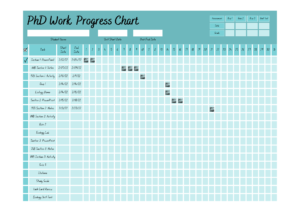As I reflect on my journey through the challenges and triumphs of presenting my PhD progress to the doctoral committee, I’m reminded of the invaluable lessons learned and the transformative experiences gained along the way.
1. Diverse Committee Composition: From the outset, the composition of the doctoral committee struck me with its diversity—comprising experts from within and outside my university, each member brought a unique perspective and wealth of knowledge to the table. Their ability to seamlessly map my research problem to their respective domains underscored the richness of their insights and the importance of their feedback in shaping the trajectory of my study.
2. Thorough Preparation: Meticulously crafting my presentation was only the first step. I realized the necessity of thorough preparation, ensuring that each slide effectively communicated my research objectives, methodology, preliminary findings, and future directions. Despite the initial nerves, I remained composed and focused, drawing upon months of dedication and hard work invested in my research.
3. Anticipating Diverse Requests: During one particularly memorable meeting, the committee members had varied requests—one member asked for a demonstration of my work, while another member wanted to delve into the intricacies of my data collection, cleaning, and wrangling process. These diverse requests underscored the importance of being prepared for any eventuality during the presentation, including the need for live demonstrations and detailed explanations of data-related processes.
4. Embracing Constructive Criticism: I welcomed the committee’s feedback with an open mind. Their constructive criticism and encouragement not only bolstered my confidence but also reignited my passion for my work. I learned to recognize the invaluable role of feedback in guiding the next steps of my research journey.
5. Displaying Previous Meeting Observations: One valuable lesson I learned along the way was the importance of displaying and addressing previous committee meeting observations in subsequent presentations. It was during my second presentation that one committee member suggested this approach, highlighting the need to showcase how suggestions were addressed and incorporated into the research progress. From that point onward, I made it a regular practice to include this information in my presentations, ensuring transparency and accountability in my research journey.
In retrospect, each PhD progress presentation was a transformative experience, shaping me into a more resilient, prepared, and adaptable researcher.
As I reflect on the journey of presenting my PhD progress, I invite you to join me in exploring the intricacies of navigating these pivotal meetings. From preparation to presentation, and from feedback to refinement, each step of the journey offers valuable insights into the art and science of doctoral progress presentations.
- Introduction
- Before the PhD Progress Presentation Meeting
- During the PhD Progress Presentation Meeting
- After the PhD Progress Presentation Meeting
- Email Template to Doctoral Committee Members for Extension or Modification for the work Proposed
- Mastering the Art of Oral and Visual Presentations for PhD Presentations
- Conclusion
- Frequently Asked Questions
Introduction
The PhD Doctoral committee is constituted by the university in which the candidate has registered for PhD. The committe is there to support and guide the research scholar till his final thesis is submitted. The committe involves the experts in the domain of the candidate from various universities and research labs. The Committee will evaluate your progress and help to make sure that you are on track to get your dissertation within a reasonable time.
At the beginning of your research, their focus will be on making sure you have defined reasonable and achievable objectives. Later, they will help you decide when it is time to write your thesis. Finally, they will be there at your thesis seminar and defence presentations. Their support as mentors will likely continue as you move on in your career.
Doctoral committee meeting happens usually once in 06 months. Here it is expected that the research scholar has to present his PhD progress work of the past six months. The meeting should not be felt like an exam. The outcome should be productive advice to you for your future research.
The Presentation of PhD Progress Report to Doctoral Committee Members happens in three stages namely:
i) Before the meeting: i.e. Once you start preparing the report for the meeting to till the meeting begins.
ii) During the meeting: i.e. From entering into the meeting hall to till the meeting gets over and
iii) After the meeting: i.e. From the time meeting concludes to till the next six months before you really start preparing for your next meeting report.
Before the PhD Progress Presentation Meeting

Along with your supervisor go through all the comments given in the previous PhD progress doctoral committee meeting. Discuss in detail with your supervisor the work carried out for the past six months. If any issues are still pending have justification for not addressing or partially addressing those issues.
Do not hide details regarding the implementation and pending issues with your supervisor. This actually helps the supervisor to defend you and take inputs from the committee members regarding the future course of directions.
A summary of PhD progress and plans should be prepared and submitted to the Doctoral committee at least one week prior to the meeting. Make sure that you have gone through the report with all grammatical corrections and plagiarism checks.
Send out the agenda to your committee members beforehand, but also remind them of the topics you want to cover before you begin the presentation. If you have any manuscripts published or accepted send your committee a copy of the same.
You should prepare a PhD progress presentation (no more than 20 minutes without interruption) that includes a brief background of your research, objectives and the work carried out from the last presentation to till date. Without fail discuss in detail the presentation slides with your supervisor. In your presentation slides list all the previous comments and your response for each committee in the form of a table.
If you are planning to change the title of your work getting consent from the committee members is essential. Have at least 04-05 titles which you and your supervisor feel appropriate beforehand. This will ease the process of changing the title immediately in the meeting and the committee can recommend the same to the university along with regular suggestions.
The best way to ensure that your PhD progress meeting goes smoothly is to meet individually with each committee member to discuss your results well in advance. If you cannot meet with them in person, share your results (refer my blog on how to write result section) over email and ask for their feedback. If there are any disagreements, resolve them before the meeting by speaking with your supervisor to ensure that the meeting goes smoothly.
Summary of Plan of Actions Before PhD Progress Presentation Meeting
| 1 | Review previous committee comments and discuss the past six months’ work with your supervisor. |
| 2 | Submit a summary of PhD progress and plans to the committee before the meeting. |
| 3 | Share agenda and relevant materials with committee members in advance. |
| 4 | Prepare a concise progress presentation with background, objectives, and recent work. |
| 5 | Seek committee consent if changing the title of your work. |
| 6 | Have individual meetings with committee members to discuss results and seek feedback. |
| 7 | Maintain open communication with your supervisor about implementation and pending issues. |
| 8 | Include a table in the presentation slides to address previous comments from each committee member. |
| 9 | Ensure grammatical correctness and perform plagiarism checks in the progress report. |
| 10 | Resolve disagreements or issues with your supervisor beforehand for a smooth presentation. |
During the PhD Progress Presentation Meeting

Before the start of the PhD progress presentation give copies of the one-page summary to other faculty members who are attending the session. Submit copies of the complete report to the committee members including your supervisor. No need to present details of any published work. Provide a reprint or preprint, preferably ahead of the meeting. If your work is software based then keep the demo ready. If you do not have a working module then show the video demonstration of the model. This will help the committee members to suggest future directions for your work.
During your PhD progress committee meeting, you should focus on the last six months’ work rather than the background. Only spend as much time on the background as is relevant to what you will be talking about.
There should not be any surprise slides/facts to your supervisor during your committee meeting.
At your first PhD progress Doctoral committee meeting, you will present an outline of your plan for your research. You can build a detailed description of what you plan to do ( literature survey to carry out, algorithms or theorems to study, experiments to carry out, software and hardware components to add, systems integration to perform, tests to accomplish ). The plans can be represented with specific milestones and timelines with a Gantt Chart.
Example: The sample Gantt chart below shows a set of activities planned for the next few months for the Research work. This can be extended to any length. This chart helps the committee members to know how well the researcher has planned the research activities.

At subsequent PhD progress meetings you should present a brief introduction (one or two slides) to remind the committee of your research area – don’t expect them to recall everything from the last meeting, but no need to go into great detail. Aim to put your work in context.
Show your current working objective in the form of a block diagram. This will set the boundary for the presentation and discussion. This will help the committee members to focus on the specified objective. For example in the figure below the candidate is focusing on the “Wheeled mobile Robot” objective in Robot Path Planning.

Make sure you are comfortable moving back and forth among your slides. Do not cross the time limit. Add photographs of any field visits for data collection, or conference presentations in your presentation slides. If you had any interactions with domain experts in your area then add interaction details with a date. If you have visited any organization as a resource person relating to your Ph.D. work with your supervisor then add that details.
Seek advice from your committee members during the meeting. Note down all the suggestions by yourself or ask one of your research colleagues to note the same. This is highly desirable, almost to the point that you should make it mandatory. Give a timeline of your plans. What will you be doing over the next month, and what do you hope to accomplish before your next meeting in the next six months’ time.
Keep additional slides along with your regular slides. Get into additional slides detail if any clarifications are sought on any equations or algorithms etc.
Additional slides can be presented as follows:
i) The equipment details you are planning to purchase or currently using for implementation.
ii) The Algorithms which you have implemented or planning to implement.
iii) The mathematical model you have developed, or
iv) Any slides that you think are important but do not have time to cover at the end of your presentation.
Presentation Tips
Here are some tips regarding the presentation, including time management, devices, backup, laptop usage, uploading PowerPoint, video, and audio:
- Time Management:
- Practice your presentation beforehand to ensure it fits within the allocated time.
- Use a timer or stopwatch during practice sessions to gauge your pace.
- Be mindful of the time during the actual presentation and make necessary adjustments to stay on track.
- Devices and Backup:
- Ensure your laptop or presentation device is in good working condition.
- Carry a backup copy of your presentation on a USB drive or cloud storage.
- Test the compatibility of your presentation files with the equipment at the presentation venue in advance.
- Laptop Usage:
- Close any unnecessary applications or notifications on your laptop to avoid distractions.
- Disable sleep mode or screensavers to prevent interruptions during the presentation.
- Familiarize yourself with the laptop’s function keys or shortcuts for adjusting display settings, volume, etc.
- Uploading PowerPoint:
- Save your PowerPoint presentation in a compatible format (e.g., PPT or PPTX).
- Verify that all embedded media (images, videos, audio) are properly linked and functional.
- If possible, upload your presentation to the venue’s computer system before the session to avoid last-minute technical issues.
- Video and Audio:
- Check the audio and video components of your presentation beforehand to ensure they work properly.
- If you plan to play a video, ensure it is in a compatible format and smoothly integrated into your presentation.
- Test the sound levels to ensure audibility for everyone in the room.
Additional tips (from personal experience):
- Rehearse your presentation multiple times to build confidence and familiarity with the material.
- Prepare cue cards or key points to refer to if needed, but avoid excessive reliance on them.
- Maintain eye contact with the audience to engage them and convey confidence.
- Speak clearly and project your voice to ensure everyone can hear you.
- Use visual aids and diagrams to enhance understanding and clarify complex concepts.
- Incorporate storytelling or real-life examples to make your presentation more engaging.
- Practice smooth transitions between slides and maintain a logical flow throughout.
- Be prepared to answer questions and engage in discussions following your presentation.
Remember, the more prepared and confident you are, the better you can deliver your presentation effectively.
Summary of Plan of Actions During PhD Progress Presentation Meeting
| 1 | Share one-page summary with attending faculty. |
| 2 | Submit complete report to committee members. |
| 3 | Provide reprint/preprint of published work. |
| 4 | Prepare software demo or video demonstration. |
| 5 | Focus on the last six months’ work during the meeting. |
| 6 | Avoid surprising your supervisor with new slides or facts. |
| 7 | Present an outline of research plan with milestones and timelines. |
| 8 | Use Gantt chart to illustrate research activities. |
| 9 | Provide brief research area reminder. |
| 10 | Use a block diagram to show current objective. |
| 11 | Stay within the time limit and be comfortable with slide transitions. |
| 12 | Include photographs of field visits or conference presentations. |
| 13 | Add details of interactions with domain experts and organization visits. |
| 14 | Seek advice from committee members and note down suggestions. |
| 15 | Present a timeline of plans for the next month and next six months. |
| 16 | Prepare additional slides for equipment details, algorithms, models, or important information. |
| 17 | Address additional slides for clarifications on equations or algorithms. |
After the PhD Progress Presentation Meeting

End your PhD progress committee meeting with a summary of what you have discussed, common points that you have reached and an action plan for the next six months. Your action plan needs to have “actionable” items, specifically what milestones you will work towards after the meeting and approximate timelines.
A written summary of the PhD progress committee meeting will be prepared by the supervisor and the committee, and that will be sent to the University. You will receive a copy of this and a copy will be placed in your research file.
Send an email note to each of your committee members through your supervisor to thank them for their time, and summarize the action items or milestones you agreed to. This will give your committee members another chance to give you feedback or suggestions.
During the meeting, you might have accepted to complete some implementation before the next meeting, but you may run out of time or you may not get any ideas regarding implementation. In such situations, have a discussion with your supervisor and the committee members and discuss the challenges faced by you. They may either extend the implementation time or ask you to change the methodology of implementation.
Simply do not wait for suggestions from committee members till the next PhD progress presentation meeting. In order to build trust between you and your committee members, you need to take committee members and your supervisor into confidence before taking any major decisions.
Summary of Plan of Actions After PhD Progress Presentation Meeting
| 1 | End the meeting with a summary, common points, and an action plan for the next six months. |
| 2 | Ensure the action plan has actionable items and approximate timelines. |
| 3 | Send a written summary of the meeting to the University. |
| 4 | Send a thank-you email to committee members, summarizing agreed action items or milestones. |
| 5 | Discuss challenges with your supervisor and committee members regarding implementation. |
| 6 | Seek extension or consider changing the implementation methodology if needed. |
| 7 | Seek an extension or consider changing the implementation methodology if needed. |
| 8 | Don’t wait for suggestions until the next progress meeting; involve committee members and your supervisor in major decisions to build trust. |
In the meeting, the committee might have suggested publishing your work in a quality conference or journal for better citations. Selecting a reputable journal and avoiding predatory conferences and journals is crucial for maximizing the visibility and impact of your research article.
By publishing in a respected journal, you increase the likelihood of attracting a broader and more qualified readership, thus increasing the chances of your article being cited by other researchers. Choosing the right journal involves considering factors such as the journal’s scope, target audience, impact factor, indexing in reputable databases, peer-review process, and overall reputation in the field.
Additionally, it is important to stay vigilant and avoid predatory conferences and journals that may engage in unethical practices or lack rigorous peer-review processes. These predatory outlets may hinder the credibility and recognition of your work. By carefully selecting a reputable journal, you position your research for greater exposure, credibility, and citation potential.
Visit my articles on ” How to identify and avoid predatory conferences and journals” and “Identifying Reputable journals for your research paper“. These articles will help you in getting your articles cited by many authors.
Email Template to Doctoral Committee Members for Extension or Modification for the work Proposed
Here is an email template which you can communicate to your doctoral committee members in case you fail to keep the deadline or are unable to work on the ideas you proposed. Please take consent from your supervisor before sending any communication to Doctoral Committee members.
Dear [Committee Member],
I hope this email finds you well. I am writing to provide an update on my progress since our last meeting and to seek your guidance regarding some challenges I have encountered.
As you may recall, during our last meeting, I agreed to complete a particular implementation before the next meeting. However, I regret to inform you that due to unforeseen circumstances, I have been unable to meet this deadline. I have made every effort to complete the implementation as planned, but I have encountered some unexpected roadblocks that have delayed my progress.
I am writing to seek your guidance regarding how best to proceed. Given the current circumstances, I am unsure whether it is feasible to complete the implementation within the original timeline. Alternatively, I would be open to exploring alternative methodologies or approaches to achieving the objectives we have discussed.
I am hopeful that we can find a way forward that meets everyone's expectations and allows me to continue making progress toward completing my dissertation. I would be grateful for any guidance or suggestions you might have, and I am happy to discuss this matter further if needed.
Thank you for your ongoing support and guidance throughout this process.
Sincerely,
[Your Name]
Mastering the Art of Oral and Visual Presentations for PhD Presentations
Improving both oral presentation and visual presentation skills is crucial for effective communication. To enhance your oral presentation skills, focus on aspects such as clarity, organization, and delivery. Practice speaking clearly, using appropriate tone and volume, and engaging with your audience. Additionally, consider refining your body language, utilizing effective gestures, and maintaining eye contact. For further guidance and resources on honing your oral presentation skills, you may explore reputable platforms and online courses available in this domain.
When it comes to visual presentation skills, it is essential to create visually appealing and impactful slides or visuals. Pay attention to design elements, such as color schemes, fonts, and layout, to ensure coherence and readability. Utilize visuals, such as graphs, charts, and images, to convey information effectively. Incorporate appropriate animations or transitions to enhance the flow and engagement of your presentation. To access valuable tips, techniques, and tools for enhancing your visual presentation skills, you can explore recommended platforms and tutorials available online.
If you are interested in further developing your oral presentation skills, I recommend checking out this comprehensive course on oral presentation skills. It covers essential techniques, strategies, and practical exercises to help you deliver impactful presentations confidently. Likewise, if you want to enhance your visual presentation skills, you may find this resource on visual presentation design highly beneficial. It provides valuable insights, best practices, and examples to create visually stunning and effective presentations. Feel free to explore these resources to elevate your presentation skills and captivate your audience.
Conclusion
Presenting your PhD progress report to the doctoral committee can be a daunting task, but it is an essential part of your PhD journey. The committee is there to provide guidance and support, ensuring that you are on track to complete your dissertation within a reasonable time. It is crucial to approach the committee meeting with a positive attitude and view it as an opportunity to receive productive advice for your future research.
Remember that the presentation of the progress report to the committee happens in three stages: before, during, and after the meeting. The preparation of the report should be meticulous and thoughtful, and during the meeting, you should be open to constructive feedback and suggestions. After the meeting, you should take note of the committee’s recommendations and use them to shape your future research endeavours.
As you move forward in your career, the support and guidance of the doctoral committee will likely continue to be a valuable resource. By effectively presenting your progress report to the committee, you can make the most of this opportunity and receive the guidance you need to succeed in your PhD program.
Frequently Asked Questions
What should be included in the one-page summary for PhD Doctoral committee members?
Research Objective: Clearly state the objective of your research and the problem you are addressing.
Methodology: Provide a brief description of the methodology or approach you are using to conduct your research.
Key Findings: Highlight the major findings or results you have obtained so far in your research.
Progress Update: Summarize the progress you have made during the past six months, highlighting significant achievements or milestones reached.
Challenges: Briefly mention any challenges or obstacles you have encountered in your research and how you are addressing them.
Future Plans: Outline your planned next steps and future goals for your research, including anticipated timelines or milestones.
Relevance and Impact: Discuss the relevance and potential impact of your research in your field or discipline.
Support Needed: Specify any specific support, resources, or expertise you require to further advance your research.
How can I effectively demonstrate a software-based project during the PhD progress presentation?
To effectively demonstrate a software-based project during the presentation:
Have the demo prepared and functional
Show a video demonstration if the software is not available or requires specific conditions
Focus on showcasing key features and functionalities
Provide context and explain the purpose of the software
What level of detail should I include in the background section of my presentation?
Include only the necessary level of detail in the background section of your presentation, focusing on what is directly relevant to your research and the specific objectives you will be discussing. Keep it concise and provide enough context to help the doctoral committee members to understand the significance and motivation of your work without delving into unnecessary details.
How can I ensure that there are no surprises for my supervisor during the Doctoral committee meeting?
Maintain open and regular communication with your supervisor throughout the research process.
Share progress updates, challenges, and findings with your supervisor in a timely manner.
Discuss any potential issues or deviations from the original plan as soon as they arise.
Seek feedback and guidance from your supervisor at various stages of your research.
Keep your supervisor informed about any changes in methodology, data, or results.
Address any concerns or questions from your supervisor before the committee meeting to align expectations.
What types of questions can I expect from the committee members regarding my research plan?
The types of questions you can expect from committee members regarding your research plan may include:
Clarification questions seeking a deeper understanding of your research objectives, methodology, or proposed experiments.
Questions about the theoretical framework or literature review supporting your research.
Inquiries about the feasibility and potential limitations of your proposed research.
Questions related to the significance and impact of your research in the field.
Suggestions for alternative approaches or methodologies to consider.
Questions about the expected timeline and milestones for your research.
Inquiries about potential ethical considerations or data management strategies.
Questions exploring the potential implications and practical applications of your research.
Requests for additional details or explanations on specific aspects of your research plan.
Questions about the expected contributions of your research to the existing body of knowledge in your field.
How should I respond to suggestions and feedback given by the committee members during the meeting?
When responding to suggestions and feedback given by the committee members during the meeting:
Listen actively and attentively to understand the suggestions and feedback.
Thank the committee members for their input and valuable insights.
Remain open-minded and receptive to different perspectives and ideas.
Clarify any points of confusion or seek further clarification, if needed.
Acknowledge the validity of the suggestions and show a willingness to consider them.
Provide thoughtful responses that demonstrate your understanding of the suggestions.
Clearly articulate your rationale if you choose not to implement a specific suggestion.
Engage in constructive discussions and ask follow-up questions, if appropriate.
Demonstrate your ability to integrate feedback into your research plan or adjust your approach.
Express gratitude for the committee members’ support and guidance throughout the process.
Under which circumstances PhD Progress Presentation can be rejected?
Lack of Clear Objectives: If your progress presentation fails to clearly define and articulate the objectives of your research, it may be rejected. The committee expects a clear understanding of what you aim to achieve and the significance of your research goals.
Inadequate Progress: Insufficient progress made during the specified period can lead to rejection. The committee expects tangible advancements in your research within the given timeframe. If there is a lack of substantial work or limited progress, they may question the feasibility or dedication to your research.
Methodological Issues: If there are flaws in your research methodology or data collection techniques, the committee may reject your progress presentation. It is essential to demonstrate a robust and well-designed research approach that aligns with the requirements of your field.
Poor Presentation Skills: Your presentation skills play a crucial role in conveying your research effectively. If your presentation lacks clarity, coherence, or fails to engage the audience, it may lead to rejection. Effective communication and the ability to present complex ideas in a concise and understandable manner are vital.
Inadequate Literature Review: A comprehensive literature review is expected in a progress presentation. If your review of existing literature is incomplete, lacks depth, or fails to address relevant studies, your presentation may be rejected. It is essential to showcase a thorough understanding of the existing research and its relationship to your work.
Failure to Address Committee Feedback: If you neglect to incorporate previous feedback and suggestions from the committee, it may result in rejection. The committee expects you to demonstrate the ability to reflect on and address their recommendations, showing your commitment to improving your research.
Remember, the specific parameters for rejection may vary depending on your academic institution and the expectations set by your doctoral committee. It is crucial to consult your supervisor and committee members for clear guidelines and expectations for your progress presentation.


